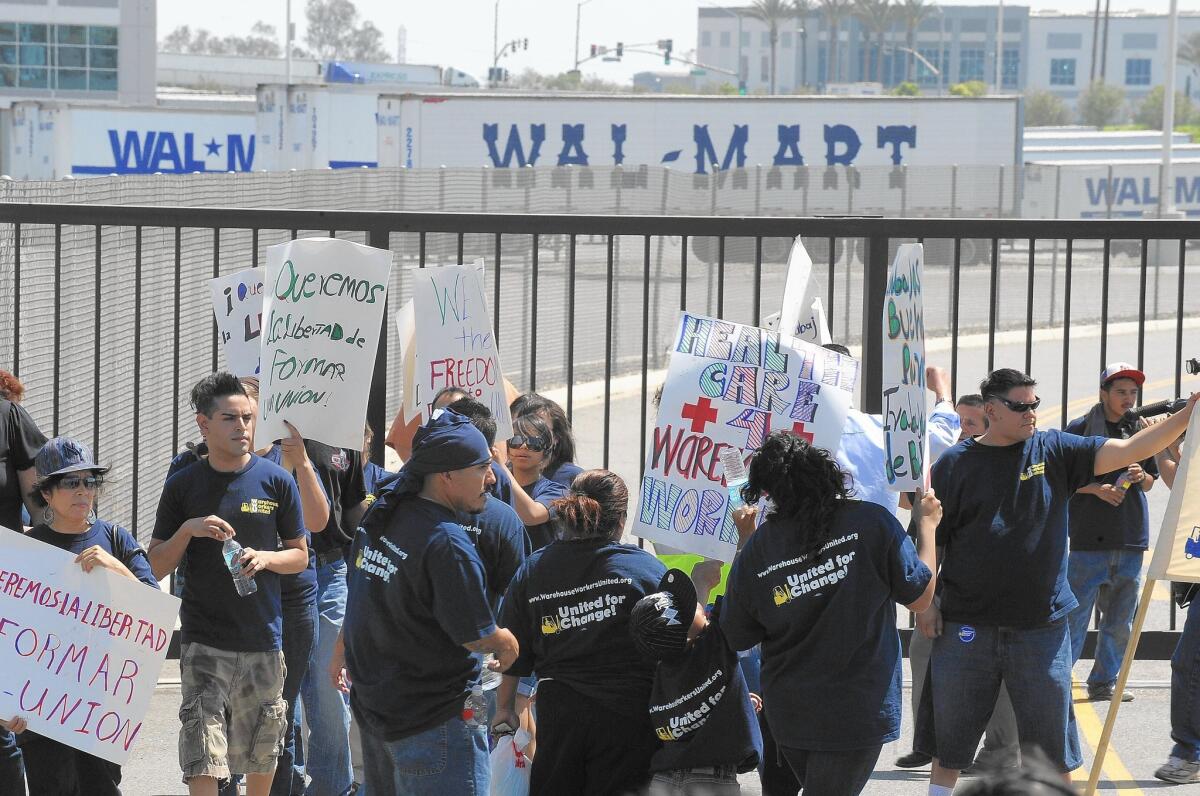Companies are on the hook for contractors’ labor policies, NLRB says

- Share via
A labor dispute at a Silicon Valley recycling center could dramatically change who corporate America counts as an employee.
The National Labor Relations Board ruled Thursday that companies using workers hired by another business — such as staffing agencies, contractors or even fast-food franchises — are still on the hook for labor violations and could be required to bargain with unions representing those employees.
The NLRB’s 3-2 ruling was handed down in the case of Browning-Ferris Industries, a Houston waste management company that used a subcontractor, Leadpoint Business Services, to staff its recycling center in Milpitas, Calif. The ruling determined that Browning-Ferris, which is part of Republic Services Inc., was a “joint employer” even though it didn’t directly hire or have immediate control over people hired by Leadpoint.
The decision will have far-reaching effects on the relationship between corporations and employees in America, especially at a time when many businesses are turning to temporary workers instead of hiring full-time employees. It’s also a striking change from past labor laws, which doled out responsibility only to companies with direct control over hours, wages and working conditions for employees.
Labor experts said many companies reliant on workers who are a few steps removed from their direct management will now have to rethink how they do business. In recent decades, labor advocates have been concerned that parent firms have been able to evade requirements for collective bargaining by outsourcing work to temporary staffing agencies or subcontractors.
Many companies are going “to take a hard look at their use of staffing agencies; their use of contractors and subcontractors; and if they are a franchiser, their business model with how they relate to franchisees,” said Rebecca Bernhard, a labor attorney at Dorsey & Whitney.
A lot of those companies depend on “outsourcing” labor to suit their needs, she said. “Now that’s not as viable of an option anymore.”
The ruling benefits the growing slice of the American workforce working minimum-wage jobs or at temporary agencies.
“It’s a great boon for contingent workers, which constitute such a growing part of our workforce and who are on the periphery,” said William Gould IV, emeritus professor at Stanford University Law School and a former chairman of the NLRB in the 1990s.
Gould said the previous standard was a much bigger hurdle for employees, who had to prove that the parent company had much more direct control over their operations in order to be considered a “joint employer.”
The decision applies not only to employees who want to engage in collective bargaining but also to those who simply want to protest unfair working conditions.
“It will impact workers who have never even thought about the collective bargaining process but simply say, ‘I want you to change the conditions here, the wages, the heat in the facility, which I think are wrong,’” Gould said. “The boss can’t say, ‘Hey, I’m going to penalize you for doing that.’”
The ruling could change operations of high-profile companies in a diverse group of industries, such as Wal-Mart, which subcontracts out warehouse work, and franchise-heavy companies such as McDonald’s and Burger King.
Business groups and companies immediately lambasted the NLRB’s ruling as a politically driven maneuver that will hurt the economy. The three Democrats on the board voted for the ruling and the two Republicans voted against.
“Small business subcontractors and franchisees provide millions of jobs for American workers,” the National Retail Federation said in a statement. It’s “just one more example of unelected government bureaucrats creating roadblocks in the path of job creation and economic growth.”
McDonald’s, for its part, emphasized that the definition of a joint employer does not apply to the burger chain, even though the NLRB last year said that it did. That’s the same reasoning that many fast-food companies have used to distance themselves from the protests for a higher minimum wage that have swept through the country in the last few years.
“We do not have the authority to direct or co-determine the hiring, firing, wage rates, hours, or any other terms of employment of our franchisees’ employees,” McDonald’s said Thursday.
The ruling also amps up the potential bargaining power of unions, which have lobbied to expand the definition of which companies could be considered a joint employer.
“It tilts things somewhat more in the union’s direction,” said Daniel J.B. Mitchell, former director of UCLA’s Institute for Research on Labor and Employment.
Starting in the 1980s, companies increasingly began using workers from temporary-staffing agencies as if they were regular employees, Mitchell said. “The lines began to blur about what makes you an employee of one employer versus another.”
“If you’ve got one employer supplying employees, but the other employer is telling them when to report and what to do, they begin to look more like they’re the employee of the party that’s actually in control,” he said.
The decision was cheered by the Teamsters, the union that wanted to organize the recycling center workers at the heart of the ruling. It maintained that Browning-Ferris had enough sway over the working conditions and pay of those employees, even if they were hired by another company, to qualify as a joint employer.
“Employers will no longer be able to shift responsibility for their workers and hide behind loopholes to prevent workers from organizing or engaging in collective bargaining,” Teamsters General President Jim Hoffa said.
The ruling could kill much of the appeal of staffing agencies, which have boomed in recent years. Many businesses, burned by hard times during the recession, remain reluctant to expand their payroll and are instead turning to temporary workers. The Affordable Care Act heightened the appeal of temporary workers; corporations utilizing their services were not responsible previously for providing health insurance.
“Now we have a question of who is the employer,” attorney Bernhard said. “If the NLRB says they are both employers, which one has to give health insurance?”
But before any of these effects are felt, labor experts say corporations in the direct line of impact will be duking it out in the courts.
“They will fight it to the end,” said John Alan James, chairman emeritus of Pace University’s Center for Global Governance, Reporting and Regulation.
More to Read
Inside the business of entertainment
The Wide Shot brings you news, analysis and insights on everything from streaming wars to production — and what it all means for the future.
You may occasionally receive promotional content from the Los Angeles Times.












